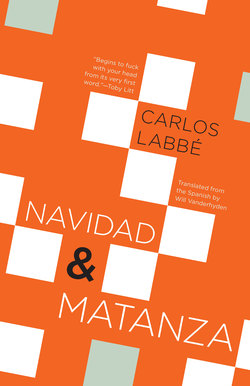Читать книгу Navidad & Matanza - Carlos Labbe - Страница 10
На сайте Литреса книга снята с продажи.
Оглавление7
ALL OF THIS REMINDS me of the case of Navidad and Matanza, in the summer of 1999. At the time I was writing for a journal whose proprietor was a notorious business executive, and because of this we were tacitly forbidden to write about the most popular topic in the office: disappeared-detainees. This was, of course, during Pinochet’s judicial hearing in London. But even more important was the fact that, at the beginning of the year, Judge Guzman had identified the body of our secretary’s father in an excavation in the Atacama Desert. Suddenly what had been a really worn out subject took on an archaic and distant force that came to completely disrupt our work environment. And so, I’m not sure if it was out of blind solidarity, or a desire to get out of the office, but during those two months we journalists felt oddly compelled to investigate, anywhere we could, news of abductions, disappearances, or reports of missing persons in the province. I began looking into the case of a brother and sister who disappeared in Navidad.
Navidad, a small town in Region VI, is the gateway to that obscure stretch of coastline between Santo Domingo and Pichilemu. A couple miles farther along is its twin village, the no less bucolic beach town, Matanza. The area enjoyed several months of touristic splendor when the secret VIP club of a famed international resort temporarily occupied the beach during the last summer of the past millennium. There are about ten thousand members in this club who, every five years via unknown channels, receive conceptual instructions and coordinates of latitude and longitude announcing the unfolding of a unique, unprecedented event. That year, the members received at their doors a young Australian man who handed them an invitation and recited a supposedly unpublished poem by Edgar Lee Masters entitled “The Hotel Room,” in whose final lines appeared the password: “Transensorial beyond seasons / the Spanish groom said / matanza y natividad, heaven and hell.”
The business executive Jose Francisco Vivar recalls that his family received the Australian visitor in September of 1998. Vivar knew it was a representative of the VIP club and he was pleased the event was going to take place in Chile. Since the trip to Navidad wouldn’t be that expensive, he’d be able to bring along his wife and their two children, Bruno (then 19) and Alicia (14). “I have nothing else to add,” he said, in a report in a daily newspaper from that time, “just that after twenty years of enjoying these events of infinite relaxation, alone or with my wife, I thought the experience would be even better with my whole family. But that was not the case.” At that point, according to the report, Jose Francisco Vivar broke down. “We’d been in Navidad for two weeks. One afternoon, a Thursday, Teresa and I left the children, who wanted to stay at the beach a while longer. We went back to the hotel where we showered, changed clothes, and got something to eat. At seven we planned to meet the children in the Room of Shadows, a site the organization had set up to put on a variety of shows, a sort of Matanza bazaar. That night, Patrice Dounn, the Congolese thereminist was performing.” But Jose Francisco and Teresa never saw their two children again. The image of the two youths shouting goodbye and running toward the waves is the last that they have. Alicia and Bruno officially disappeared the afternoon of January 18th, 1999.
